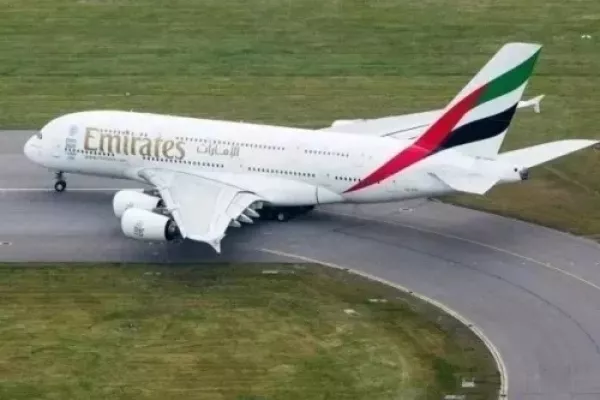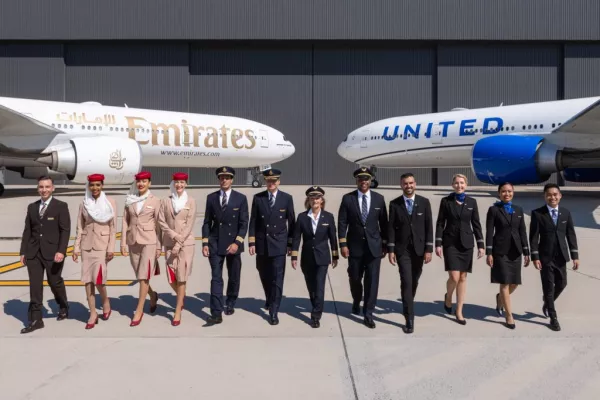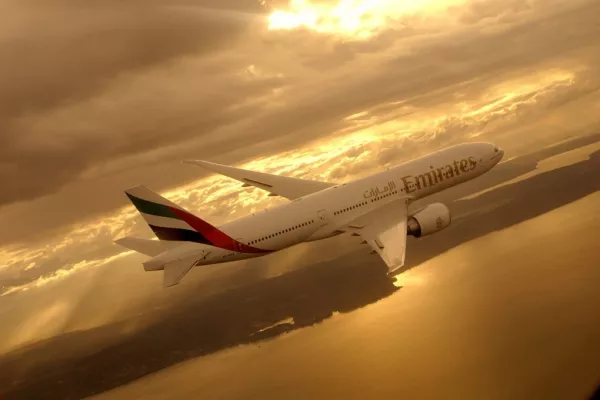Emirates expects its full fleet of Airbus A380s and Boeing 777s to be in use by the end of the year as the rollout of coronavirus vaccines renews confidence in travel.
Several countries have started or announced programmes to inoculate residents, with some believing that they can vaccinate a majority of their population this year.
Emirates president Tim Clark has repeatedly said that a vaccination programme will be vital to any recovery for the travel industry, which saw demand collapse in 2020.
71-year-old Clark, who has delayed his retirement to tackle the crisis, said this week that he does not think that a recent wave of new infections and restrictions in some countries will further impede the recovery.
"I think we always anticipated a bumpy patch," he told Reuters in an interview. "Once the pandemic is over and the global inoculation programme has kicked in at pace, then I see the restoration and a recapture of activity curves in all aspects of the global economy at pace, probably in the middle to back end of this year."
Throughout the coronavirus crisis, Clark, who is a respected industry veteran, has been more bullish about a rebound than many of his peers.
Emirates is currently flying 17 of its 115 A380s and 137 of its 160 777s, with some passenger jets operating as cargo planes.
Last week, Emirates was flying to approximately 120 destinations, compared to 157 before the pandemic.
"We're in a good place with the fleet that we have, albeit not as highly utilised as it was prior to the pandemic, to start operating again as soon as the doors open with regards to accessibility to the markets," Clark said.
Emirates, which reported a $3.4 billion half-year loss and received $2 billion from the Dubai government to help it through crisis, will report a full year loss for the year ending March 31, he said.
The airline is expected to return to profitability in the year ending March 31, 2023, and, as it stands, does not need any more financial assistance from the government, Clark said.
Boeing 777x Entry To Service May Slip To 2023 "Or Even Longer"
Clark also said this week that Boeing Co's 777X might not enter into service with airlines until 2023 or even later, amid uncertainty over the development timeline of Boeing's biggest twin-engine jet and when it will be certified.
Boeing has been developing the widebody jet, which is a new version of its popular 777 aircraft, with the goal of releasing it in 2022, which is already two years later than planned.
The 777X will be the first major jet to be certified since software flaws in two Boeing 737 MAX planes caused fatal crashes and prompted accusations of cozy relations between the company and the US Federal Aviation Administration (FAA).
"It is a question of when that aircraft is going to be completed and certified and offered for entry of service. That could be '22, could be '23, it could be even longer," Clark told Reuters in an interview. "So we will just wait and see as to what Boeing will do with regard to that and we will take a view as to how they fit into the fleet at that particular time."
Boeing could not be immediately reached by Reuters for comment.
Clark said that he expects regulators to place the new jet under a higher level of scrutiny as a result of the MAX crisis, and Boeing's chief financial officer, Greg Smith, has warned that the market entry will be influenced by the requirements of regulators.
But Clark doubts that this will add significantly to existing delays.
"This is essentially a modern 777, which of course is a workhorse for international travel, and it has been a thoroughly reliable, excellent bit of Boeing design, so I don't see why the 777X should be any different," Clark said.
European regulators have said in particular that they will subject the 777X to extra scrutiny after the fatal crashes prompted the 20-month grounding of the 737 MAX.
The MAX crashes in Indonesia and Ethiopia killed 346 people within five months in 2018 and 2019 and triggered multiple investigations and weakened US influence over global aviation.
Emirates originally ordered 150 of the 777X series, which seats up to 406 people, and now has 126 on order. Analysts say that the COVID-19 crisis has clouded the demand for such big jets.
The plane was originally due to enter service with Emirates in June of 2020.
Boeing Must Recognise Top-Down Role In MAX Flaws
Clark wants the Boeing to demonstrate fundamental changes after producing a flawed 737 MAX jet and has urged it to recognise "culpability and accountability" from the very top.
He said that a crisis over crashes of its 737 MAX has damaged the air travel industry as a whole, but that he is confident that the redesigned jet is safe.
"Boeing need to take a good hard look at themselves; I'm sure they have," Clark told Reuters.
"But they have to [show] evidence to people like the airline community, the traveling public, that they have made the changes that are required of them in a transparent manner," he said, while also suggesting a shift of emphasis on financial matters.
"That [can] only be done at board level and executed...at senior level," Clark said. "I believe they still have work to do in Boeing to get themselves sorted out...There is a top-down culpability and accountability, and they need to recognise that."
Boeing did not immediately respond to a request from Reuters for comment.
The comments from the head of one of the world's biggest carriers, with Boeing jets worth over $50 billion at list prices on order, are among the most direct airline criticisms since a 20-month ban on MAX flights was lifted in December.
Clark's critique, which is aimed at the highest echelons of the world's largest aerospace company, stood in contrast to the settlement's focus on two lower-level Boeing employees who prosecutors say deceived US regulators.
"Clearly, there were process and practices, attitudes - DNA if you like - that needed to be resolved from the top down. It is pointless shuffling the deck," Clark said, though he stopped short of laying out precise actions that Boeing should take.
Boeing should understand the magnitude of damage to the industry and make "fundamental structural changes," Clark said.
Since the crashes, Boeing has fired its former chief executive, added a board safety committee and agreed to strengthen internal controls. However, Boeing turned for its new CEO to an insider, Dave Calhoun, who is a long-serving board member.
It says that it has learned "many hard lessons" from the crisis.
On Wednesday January 13, Calhoun named Mike Delaney chief aerospace safety officer, which is a new role.
The US Federal Aviation Administration, which has admitted mistakes during certification, has seen its global leadership tarnished by the crisis.
Clark backed the European Union Aviation Safety Agency for taking a "very hard line" over the re-design.
"This isn't a sort of motherhood level scrutiny," he said. "This is a detailed assessment of everything that makes that aircraft fly, then I think it should something that people should be relaxed about flying in."
News by Reuters, edited by Hospitality Ireland. Click subscribe to sign up for the Hospitality Ireland print edition.









